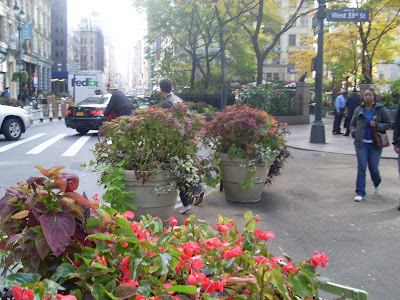A few things struck me in New York City... One was the frequency with which I encountered parks, plazas, and community gardens. You didn't have to intentionally go to a park, you just kind of wound up in one on your way somewhere. There is Central Park, of course, an enormous presence throughout upper Manhattan. But there are also delightful public spaces crammed into every available spot. Benches and landscaping invite passerby to linger for a few extra minutes, and friends meet on street corners and near subway stations.
 |
| Park benches and gardens line the Broadway median |
 |
| A cyclist greets friends at Union Square |
 |
| Moments of beauty in everyday life |
They are even reclaiming parts of the roadway, using planters, paint, and attractive fences to create places to walk and sit. (I'll describe how this affects bicycling in another post.)
The sidewalks themselves are enormous compared to most other cities. And with good reason; there are thousands - millions? - of people using them all day and night. I can't even guess how many people I came face-to-face with in the day I spent walking around. There are social norms in place so that you limit your actual interaction with others to a manageable level, such as not quite making eye contact. But you can interact if you want to, especially with people you encounter regularly. No matter what, you realize that you are in a diverse community but still have much in common with its members.
This opportunity for interaction is largely lacking in Atlanta, and people are noticing. At a recent meeting, one person after another said, in their own ways, "We don't have a public life in the Atlanta region. We don't have public places to meet, to express ourselves to the community, to interact with people who aren't exactly like us, to create a society. Everything is gated, commercialized, privatized. There is no commons."
One of the facts I heard about NYC, while I was there at my conference, was that 80% of their public space is their streets. This includes the sidewalks and bikeways. So the way that they use that space is crucial for creating a society, a public realm. I would assume the figures are similar for Atlanta's public space, but ours in almost entirely used for motor vehicles. You can't interact from a car. Honking and shouting are not a basis for community. Even rolling the window down to talk to a neighbor feels somewhat divisive, as you strain your voice over the sound of the motor and continually glance behind you for approaching traffic. And although local streets make up most of the transportation network, the majority of car travel takes place on major roads and highways where no meaningful interaction is possible at all.
How does this affect our perception of society? Will we support different public policies as a result? Does it change our perception of our role in the political system? Does it limit our ability to get unbiased information about the world around us? And if it is changing our sense of community for the worse, what can we do about it? Will we have the strength to change the existing policies, and create a new social and political future?
 |
| The High Line: NYC created a new park on elevated train tracks several stories off the ground |







I guess the "problem" with public spaces is that they breed something very dangerous - informed people who care. When I lived in the Highlands district of Louisville, KY I enjoyed numerous public spaces from the popular Olmsted parks to coffee shops with outdoor seating, benches on the sidewalks, pocket parks. People wanted to live in this old urban neighborhood because of the opportunity to walk and bike to places that other people who be. I enjoyed going to a locally owned coffee shop and sit for hours reading the newspaper and stopping to chat now and then with friends and aquaintances. I cared about the businesses in my neighborhood and the well-being of my neighbors. I was on a first name basis with many of my neighbors, had been in their homes, and shared meals and produce from their gardens. Even if I didn't know a name, I knew the faces and often exchanged greeting and a "how've you been?" from the front porch. A neighborhood like that has a way of motivating people to go to district forums where you get the chance to ask the chief of police what you, Joe Public, can do about graffiti or to pick up the phone and call the County Attorney's office if a porn shop just opened at the alley across from the elementary school yard. I was lucky enough at the time to be the legislative aide to the district Councilman there, a skinny senior citizen who road his bike or took a city bus everywhere and he prized our district for it sense of place and the public spaces that encouraged an active citizenry that valued community. Out here in Arizona, the philosophy is indviduality and every man for himself. If it weren't for my husband and a handful of like-minded friends, I'd be pretty lonely.
ReplyDelete